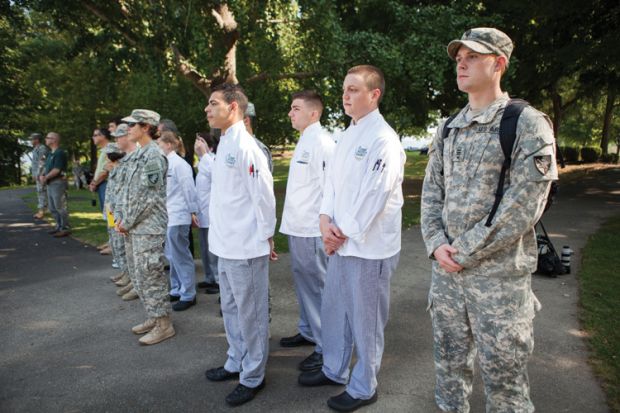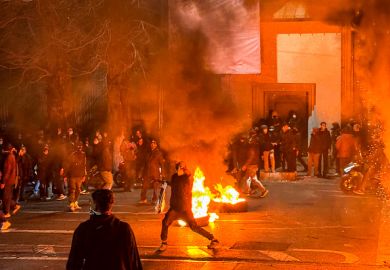The dramatic grey and black granite buildings of the US Military Academy loom resolutely over a curve in the Hudson River, where the nation’s oldest military school has stood since soon after fortifications were built as a defence against the British Royal Navy during the American Revolution.
Today, cadets in combat fatigues – future leaders of one of the world’s most formidable armies – march with perfect posture among the classrooms, training grounds and athletic fields.
Twice a year, however, young people file across the cobblestone courtyards in another kind of uniform: white jackets, comfortable clogs and toques.
It is part of a collaboration between West Point and the unlikeliest of partners, the Culinary Institute of America, one of the nation’s pre-eminent schools for chefs, just a few miles upriver on the Hudson.
The collaboration started when staff from the two institutions met one weekend at a farmers’ market. Now in its third year, the exchange was meant to encourage interaction between civilians and the military in a country where only 0.5 per cent of the population becomes part of the armed forces. But it has ended up revealing that chefs and soldiers have a lot more in common than they originally thought.
“People on the outside, when I describe this partnership, ask, ‘How did this come to be?’” said Michael Sperling, vice-president for academic affairs at the Culinary Institute. Students learning to work in the kitchen and the military, he said, share “elements such as a respect for and understanding of discipline, the ability to respond to a chain of command, and the ability to recognise that when you have to execute something, you need to do it, whether it’s a military manoeuvre or service at a certain time”.
On the military side, cadets, who are given all of 20 minutes to eat their meals in the high-ceilinged, flag-bedecked West Point dining hall (“The chefs were appalled” by this mad rush, said Ruth Beitler, who coordinates the exchange at the academy), learn to appreciate food. After all, as the old adage goes, an army travels on its stomach.
“Food is that central common denominator,” said Dr Beitler, a professor of comparative politics at the academy who directs its conflict and human security studies programme. “It’s a great part of socialisation. It’s extraordinarily important in keeping your troops healthy. And when cadets are working in places such as Iraq and Afghanistan, sharing a meal and creating trust through this meal is extraordinarily important. Food in culture plays a very, very important role.”
The programme also tears down stereotypes. One cadet told Dr Beitler that his first thought had been, “They’re cooks. How hard can their lives be, compared with mine?”
But once the cadets put on white aprons over their camouflage and spend a day in the kitchen with culinary students who are required to follow strict grooming standards and wear their own kinds of uniforms for the first two years of training, and who begin their days at 4am (at West Point the day starts at 5am), they change their minds.
For their part, the future chefs “thought that the cadets would be these blockheads, and all the same”, Dr Beitler said. “And what they found were really talented college kids.”
There are moments of inevitable humour, too.
“These are cadets who are highly trained in weaponry but they pick up [cooking] knives and they’re, like, ‘Oh my God, what do I do with this?’” said Dr Sperling.
At West Point, the chefs are taught to march in formation, fire simulated weapons, and complete obstacle-based workouts.
“We formed this immediate bond, because we realised that there’s an institution out there that’s like ours,” said James Bickmore-Hutt, a culinary student from Australia.
In both groups, he said, “There’s a very large sense of esprit de corps, a sense of pride or sense of unity, because you’re kind of unified by struggle,” Mr Bickmore-Hutt said. “The cadets related to that on such an intense level.”
When the conversations among the students grew deeper, he said, “I didn’t expect that level of emotion to come out of someone who is in the desensitising business of war.”
Cameron Voigt, a West Point cadet whose father passed through the military academy, took part in the programme and was teamed up with Mr Bickmore-Hutt. Mr Voigt added: “It was great for us to get that exposure outside of the West Point bubble.”
Mr Voigt said that he had learned that “there’s a chain of command in the kitchen. There’s such great respect for the head chef and whatever they say goes.”
There was one other thing that chefs and soldiers have in common, he said. “We all get very little sleep.”
POSTSCRIPT:
Print headline: ‘They’re cooks. How hard can their lives really be?’
Register to continue
Why register?
- Registration is free and only takes a moment
- Once registered, you can read 3 articles a month
- Sign up for our newsletter
Subscribe
Or subscribe for unlimited access to:
- Unlimited access to news, views, insights & reviews
- Digital editions
- Digital access to THE’s university and college rankings analysis
Already registered or a current subscriber?




